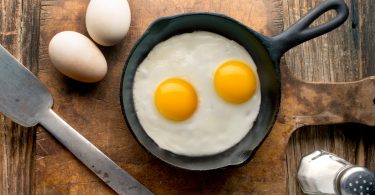The debate over egg yolks and heart health risk needs to end now. In fact, the egg yolk may just be one of the best foods to lower cholesterol. While it is true eggs are a high in cholesterol, they may just be the best food to...
Is A Paleo Diet Good For You?

A Paleo Diet is more than just a diet. It is a way of life that copies what our hunter-gatherer ancestors ate before highly processed foods were available. It consists of unprocessed meat, fish, eggs, vegetables, fruit, and nuts in variable proportions.
This diet theory stems from the idea that the modern, typical American diet is the culprit behind the growing number of health concerns including high blood sugar, high cholesterol levels, and heart diseases.
Loren Cordain, the creator and a researcher from Colorado State University, claims that this Diet is the way to a healthier, and disease-free lifestyle. It’s the way we are genetically designed to consume food.
Thus, in order to avoid these health risks and medical conditions, we should eat unprocessed foods as our prehistoric paleo ancestors did more than 12,000 years ago; in the Paleolithic era. This was a time in history where humans ate naturally available seasonal foods.
Health Benefits Attained With a Paleo Diet
If you choose to eat a paleo diet there are a few health and weight benefits. When we follow a Paleo Diet, we eat more natural foods. Limiting sugar and processed foods also have its advantages. A paleo diet is basically clean eating, no additives, no preservatives, no artificial colors. You feel more full as this diet contains a variety of all types of foods except those that leave you hungry.
Weight Loss
In research, published by the European Journal of Clinical Nutrition, seventy obese women were exposed to two different diets: the Paleolithic Diet and a diet based on Nordic Nutrition Recommendations (NNR).
The results showed that both diets led to a decrease in body weight and waist circumference. With PD, the weight loss was quicker.
Will Eating More Meat On A Paleo Diet Improve My Health?
According to results from a research study comparing the paleo diet with 4 similar National nutrition guidelines, eating paleo improves risk factors for metabolic syndrome.
Compared to the diabetes diet, the Paleo diet resulted in lower :
Average Blood Sugar Levels,
Triglycerides,
Blood pressure,
Weight, BMI and waist circumference.
High-density lipoprotein cholesterol increased.
More research conducted on the effects of the paleo diet show that the paleo diet ‘improves blood sugar, blood pressure, decreases insulin secretion, and improves cholesterol profiles’.
Will a Paleo Diet Reduce Inflammation and Build-Up My Immune System?
This diet is rich in Omega 3 fatty acids. Omega 3 fats are well established as anti-inflammatory agents. This study comparing omega 3 to ibuprofen, effects of Omega-3 fatty acids as an alternative to nonsteroidal anti-inflammatory drugs, shows they were both equally effective in reducing pain and inflammation.
A Paleolithic diet also contains adequate amounts of protein along with seasonal fruits and vegetables. The combination of these foods can help strengthen your immune system.
A Paleo Diet Grocery List
If you’re considering PD, add these foods to your grocery list:
- Lean farm-fresh meat such as beef, chicken, and pork.
- Fish, rich in omega-3 fatty acids.
- Game animals such as Quail, Bison, and Venison
- Non-starchy, seasonal vegetables like onions, peppers, broccoli, carrots, asparagus, pumpkin.
- Seasonal, fresh fruits
- Eggs
- Plant-based oils such as Olive oil, Coconut Oil, Avocado Oil, Flaxseed Oil, Macadamia Oil, and Walnut Oil
- Nuts such as almonds, walnuts, cashews
- Seeds such as pumpkin seeds, sunflower seeds
What NOT to Eat on a Paleo Diet
The rule of thumb is to avoid all foods that our Paleolithic ancestors didn't eat. This includes processed foods and most dairy products. This means you should avoid:
- Cereal Grains such as barley, wheat, rice, and rye. This excludes bread, pasta, cereal, bagels etc.
- Dairy products such as milk, butter, yogurt and cheese
- Processed Foods including processed meat
- Sweets and Artificial Sweeteners
- Salt
- Sugary Drinks and Fruit Juices
- Legumes and beans, such as chickpeas, red beans, white beans, and even peanuts
- Starchy vegetables such as potatoes.
- Refined Vegetable Oils
- Alcohol
Paleo Diet Wrap Up
The paleo diet is healthy as it is derived from a variety of natural foods that are not processed. If you choose to eat natural seasonally available foods you join the hunter-gatherer movement. You can also help improve health risk factors, improve quality of life, and control weight.
Related Articles
Is A Paleo Diet Good For You?
If you choose to eat a paleo diet (natural seasonally available foods) you join the hunter-gatherer movement. By eating a variety of foods, you can also help improve health risk factors, improve quality of life, and control...



